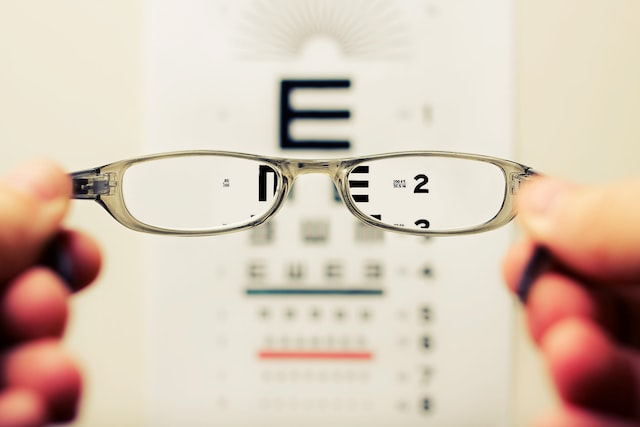Blurred vision means that your vision is fuzzy or unclear, while double vision means that you see two images of the same thing.
What is a blurred vision?
(Image by Jiří Rotrekl from Pixabay )

Blurred vision is a visual disturbance that causes objects or images to appear fuzzy, unclear, or out of focus. It can affect one or both eyes and may occur gradually or suddenly. Blurred vision can be caused by a variety of factors, including refractive errors, such as nearsightedness or farsightedness, as well as medical conditions like cataracts, glaucoma, or macular degeneration.
In addition to these causes, other factors that can contribute to blurred vision include eye strain, fatigue, dry eyes, allergies, or the use of certain medications. In some cases, blurred vision may be a symptom of a more serious medical condition, such as a stroke, brain tumor, or diabetes.
The symptoms of blurred vision can vary depending on the underlying cause. Some people may experience only mild blurriness, while others may have more severe symptoms that affect their ability to perform daily tasks such as reading, driving, or operating machinery. If you are experiencing blurred vision, it is important to seek medical attention to determine the cause and receive appropriate treatment.
What is a double vision?
(Photo by Bruno Guerrero on Unsplash )

Double vision, also known as diplopia, is a condition where a person sees two images of a single object instead of one. The two images may appear side by side, on top of each other, or at an angle to each other, and they may be of different sizes or brightness.
Double vision can be caused by a variety of factors, including problems with the muscles that control eye movement, abnormalities in the cornea or lens of the eye, or damage to the nerves that control the muscles of the eye. Other causes may include conditions that affect the brain, such as stroke, head injury, multiple sclerosis, or brain tumors.
Some people with double vision may experience symptoms such as headaches, dizziness, nausea, or difficulty with balance or coordination. The symptoms of double vision can vary depending on the underlying cause and may be temporary or long-lasting.
Treatment for double vision depends on the underlying cause. In some cases, treatment may involve correcting a refractive error, such as nearsightedness or farsightedness, with glasses or contact lenses. Other treatments may include eye exercises, medication, or surgery to correct problems with the muscles or nerves of the eye. If you are experiencing double vision, it is important to seek medical attention to determine the cause and receive appropriate treatment.
Causes for blurred vision
Blurred vision can be caused by a variety of factors, including:
Refractive errors: These are the most common cause of blurred vision and occur when the shape of the eye prevents light from focusing properly on the retina. Common types of refractive errors include nearsightedness (myopia), farsightedness (hyperopia), and astigmatism.
Cataracts: A cataract is a clouding of the lens in the eye that can cause blurry vision, faded colors, and sensitivity to glare. Cataracts are most often associated with aging but can also be caused by injury, medication use, or underlying medical conditions.
Glaucoma: This is a condition where the pressure inside the eye increases, leading to damage to the optic nerve and vision loss. In the early stages, glaucoma may cause blurred vision or mild eye discomfort, but as the disease progresses, it can lead to permanent vision loss.
Macular degeneration: This is a condition that affects the macula, the part of the retina responsible for central vision. As the macula degenerates, it can cause blurred or distorted central vision.
Dry eye syndrome: This occurs when the eyes do not produce enough tears or the quality of the tears is poor, leading to dryness, irritation, and blurred vision.
Diabetes: Diabetes can cause damage to the blood vessels in the retina, leading to a condition known as diabetic retinopathy. This can cause blurred vision, floaters, and eventually, vision loss.
Medications: Certain medications, such as antihistamines, antidepressants, and blood pressure medications, can cause blurred vision as a side effect.
Other conditions: Blurred vision can also be caused by other conditions such as migraines, multiple sclerosis, and stroke.
If you are experiencing blurred vision, it is important to see an eye doctor to determine the underlying cause and receive appropriate treatment.
Causes for double vision
Double vision, or diplopia, can be caused by a variety of factors, including:
Problems with eye muscles: Double vision can occur when the muscles that control eye movement become weak or imbalanced, causing the eyes to point in different directions.
Refractive errors: Blurred vision caused by refractive errors such as nearsightedness, farsightedness, or astigmatism can also lead to double vision.
Corneal problems: Damage or irregularities in the cornea, the clear outer layer of the eye, can also cause double vision.
Lens problems: A cataract, or clouding of the eye’s lens, can cause double vision.
Neurological conditions: Neurological conditions such as multiple sclerosis, brain tumors, or stroke can damage the nerves that control eye movement and cause double vision.
Infections: Infections such as meningitis or encephalitis can cause inflammation and damage to the nerves that control eye movement.
Trauma: Head injury or trauma to the eye or surrounding area can cause double vision.
Medications: Certain medications, such as muscle relaxants or sedatives, can cause double vision as a side effect.
The treatment for double vision depends on the underlying cause. Treatment may involve prescribing glasses or contact lenses to correct refractive errors or treating underlying medical conditions such as cataracts or neurological disorders. In some cases, surgery may be necessary to correct problems with eye muscles or the cornea. If you are experiencing double vision, it is important to see an eye doctor to determine the underlying cause and receive appropriate treatment.
When to see a doctor for blurred or double vision?
If you are experiencing blurred or double vision, it is important to see a doctor as soon as possible. Both of these conditions can be a sign of a serious underlying medical condition that requires prompt treatment.
You should seek immediate medical attention if you experience sudden onset of blurred or double vision, especially if it is accompanied by other symptoms such as severe headache, dizziness, difficulty speaking or understanding speech, or weakness on one side of the body.
You should also see a doctor if you have persistent or recurring episodes of blurred or double vision, or if you have any other symptoms such as eye pain, redness, or discharge.
Additionally, if you have a history of diabetes, high blood pressure, or other medical conditions that increase your risk of eye problems, it is important to have regular eye exams to monitor your vision and detect any problems early.
Overall, if you are experiencing any changes in your vision, it is important to see an eye doctor for a comprehensive eye exam to determine the underlying cause and receive appropriate treatment.
Featured Image By – David Travis on Unsplash









